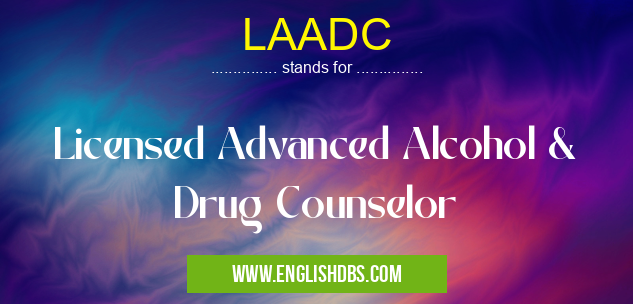What does LAADC mean in OCCUPATION & POSITIONS
LAADC stands for Licensed Advanced Alcohol & Drug Counselor. An LAADC is a highly trained mental health professional who specializes in providing care to individuals struggling with substance use disorders and addiction. LAADCs are experts at providing individual and group counseling for addiction recovery, as well as supporting family members of someone struggling with these issues. An LAADC must possess the necessary education and experience to qualify for state licensure and certification.

LAADC meaning in Occupation & Positions in Business
LAADC mostly used in an acronym Occupation & Positions in Category Business that means Licensed Advanced Alcohol & Drug Counselor
Shorthand: LAADC,
Full Form: Licensed Advanced Alcohol & Drug Counselor
For more information of "Licensed Advanced Alcohol & Drug Counselor", see the section below.
What Does LAADC Mean
The acronym LAADC stands for Licensed Advanced Alcohol & Drug Counselor, which describes an individual who provides services to clients dealing with addiction, substance use disorders, or other related issues. To become a certified LAADC, one must first meet the state requirements in terms of educational background and experience, take the relevant exams, and receive their license from the relevant state licensing board. Once licensed, an LAADC can provide evidence-based therapy and counseling services to individuals struggling with substance abuse or recovering from addiction. In addition to traditional therapeutic approaches such as cognitive-behavioral therapy (CBT), motivational interviewing (MI) and dialectical behavior therapy (DBT), an advanced alcohol & drug counselor may also employ more holistic methods such as yoga, meditation, nutrition counseling or art therapy into their practice when appropriate. Moreover, since many people with substance use disorders are also dealing with underlying clinical issues such as depression or anxiety that compound their addictive behaviors, an LAADC can safely assess these other areas of concern so they can be properly treated along with any associated addictions.
Essential Questions and Answers on Licensed Advanced Alcohol & Drug Counselor in "BUSINESS»POSITIONS"
What is a Licensed Advanced Alcohol & Drug Counselor?
A Licensed Advanced Alcohol and Drug Counselor (LAADC) is a professional who works with individuals struggling with substance use disorder. They provide therapy, guidance, and education to help these individuals recover and maintain their sobriety. LAADCs are trained to identify the underlying causes of addiction and develop individualized treatment plans that address the needs of those they serve.
What kind of training does a LAADC have?
A LAADC must have a minimum of 3000 hours of supervised professional experience working in the field of Alcohol and Drug Counseling, as well as 175 hours formal academic education related to clinical counseling theories, group dynamics, family systems and more. Additionally, they must pass rigorous examinations administered by their state board for licensure.
How can I tell if my counselor is LAADC certified?
The best way to find out if your counselor is LAADC certified is to ask them directly or look up their credentials online. Most states keep public records available that list any certified counselors licensed in the state. You can also contact your local state licensing board for verification.
How long does it take for someone to become an LAADC?
It can take anywhere from one year up to four years depending on the amount of prior experience, level of education completed, whether they attend a full-time or part-time program, and how quickly they pass their exams. There are both bachelor's degree and master's degree programs available in the specialty field of Alcohol and Drug Counseling which usually last between two to four years respectively.
What kinds of services do Licensed Advanced Alcohol & Drug Counselors Provide?
Licensed Advanced Alcohol & Drug Counselors provide a variety of specialized services including individual counseling sessions, group therapy sessions, intervention techniques for those affected by addiction in their lives, relapse prevention programs, aftercare planning services for returning clients from treatment centers or other sober living environments, supportive resources such as 12-step meetings or other support groups & much more.
Are all substance abuse counselors licensed?
No. While some substance abuse counselors may choose not to pursue licensure as an LAADC due to personal preference or cost considerations; by law all states require that individuals practicing alcohol/drug abuse counseling be credentialed either through certification or licensure before being allowed to practice independently and unsupervised.
Do I need insurance in order to receive care from an LAADC?
Many insurance plans cover psychotherapy treatments provided by an LAADC but you should always check with your insurance provider prior to making any appointments if you have questions about coverage or limits on reimbursement levels. Some vendors offer sliding scales based on financial need so don’t hesitate asking about possible discounts or payment plan options when speaking with your provider.
Are there different types of counselors within the field of Substance Abuse/Addiction Treatment?
Yes there are many different types such as Certified Addiction Specialists (CAS), Certified Addiction Professionals (CAP), Certified Substance Abuse Counselors (CSAC), Master Addiction Counselors (MAC), Clinical Supervisors (CS) etc., Each type requires specific criteria related academic credits earned from a certifying body followed by passing applicable tests given by said certifying body before one can earn the title “certified”.
Final Words:
In summary, an LAADC is a highly qualified specialist that helps those affected by substance use disorder by offering evidence-based therapies tailored to each client’s unique needs. An important part of an advanced alcohol & drug counselors job is not only treating the addiction itself but also addressing any co-occurring conditions so those suffering from these problems can find lasting relief from their struggles.
